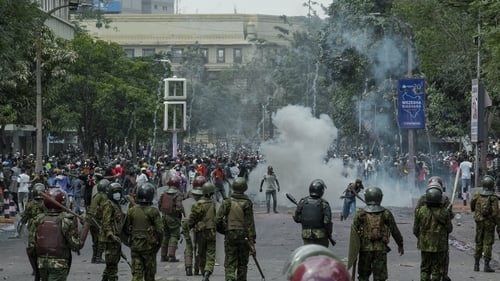Political satire is ridicule dedicated to exposing the difference between appearance and reality in public life. The justification for this mockery, is that by holding bad behavior up to ridicule we might, through art, drive change.
Butere Girls High School Plays and performances in Kenyan School's Drama fete have inspired, entertained, and challenged audiences, but at the crux of their great work is often great controversy.
In 2013, the now infamously famous School "Shackles of Doom" play caused a wild nationwide uproar due to its blunt and, according to some, scathing approach in addressing the uncomfortable topics of ethnicity and tribalism within the Kenyan context.

The play, tackled the themes of tribalism and inequality of wealth distribution head-on, talks of a dominant community that intrudes the land of a marginalised community and exploits their resources for their own gain, leaving out the very community the resources belong to from enjoying the benefits.
The play’s controversy culminated in a ban and disqualification from the National Drama Festivals by the ministry.
The 48-minute play was finally staged at the National Drama Festivals in Mombasa in April 2013, which had been organised under the theme, ‘Performance for National Healing and Reconciliation’.
While proponents hailed the scriptwriter, then Senator Malala for his courage, others bashed him, accusing him of using the students of Butere Girls’ High School, who acted out the play, for furthering his personal agenda and promoting tribalism by singling out and criticising one community.
After the ban, the issue went to court, where High Court Judge David Majanja removed the ban and ordered the Attorney General and Education Permanent Secretary to ensure the play was staged at the nationals.
The play begins with the dominant community marrying off one of its beautiful daughters, Wamaitha, to a son of the downtrodden community in exchange for land from the poor community.
At first, Wamaitha looks down upon the community and disregards its worth. However, her community convinces and pushes her to marry into the community so they can get a share of the land and, in turn, become wealthy and control the economy from exploiting the land’s oil resources.
Although at first hesitant, Wamaitha eventually agrees to marry into the land of The True People of Kana, and in the process, her community gains control of the land and resources.
At first, the True People of Kana, an allusion to the Turkana community, in their naivety believe that the presence and investment of the dominant community on their land will benefit them.
The dominant community, on the other hand, selfishly believes the investment will increase their wealth and change their lives, while disregarding the plight of the local Kana community.
For 15 years, the dominant community undertakes the construction of the Mafuta Oil Refinery. At the launch of the refinery, both communities are ecstatic, until the Kana, the owners of the land, have a rude awakening when they realise they have been shortchanged.
At the helm of the company is the CEO, Kimani and his wife, who is the Human Resources manager. Shockingly, all the top positions, such as the chief supervisor and project manager are given to members of Kimani’s community, as revealed by the names of the position holders, such as ‘Njeri’ and ‘Maina’.
Angered, the True People of Kana protest.
“What about us? The sole owners of the Kana,” they ask in shock.
“Since we are a reasonable community and for purposes of cohesion and integration we are going to appoint from this indigenous community, but as a security officer,” the HR manager answers to the protests.
When the True People of Kana complain over the lowly position, as opposed to the dominant community, which has gotten all the top positions, they are shut down fast.
In the play, just when the devolved units were being established, the fictional community of Kana complain that they are malnourished by poverty and are thirsty while the members of the dominant community quench their self-centred desires with ‘our precious liquid’. Fed up with the unfairness, the marginalised community starts rooting for a revolution.

Fast forward to 2025, Butere Girls High School students present another controversial Play titled "Echoes of War."
Butere Girls had been banned from staging their Gen Z-themed play on the grounds that its theme critiques the government.
The court, however, lifted the ban on April 3 when Justice Wilfrida Okwany suspended any letter banning or barring the school from participating in the festival.
The play explores contemporary issues like technology, governance and social justice, particularly relevant to Gen Z, and the struggle for young people on civil liberties.
It centers on a nation recovering from a civil war, with young citizens at the forefront of rebuilding efforts and critiques the role of digital spaces in governance and the power of youth in shaping societal change.
Earlier today, drama ensued in Nakuru after students of Butere Girls High School staged a walkout following a standoff with security officers who had barred journalists, spectators and other schools from the Hall.
The students, walked to the stage, sang the national anthem and walked out in protest of allegedly being denied an audience, the arrest of Malala, the scriptwriter and director of the play again and being denied props plus Public address system to use to perform.
Malala, had also been arrested by Detectives while attending a rehearsal last night, only to be released today after several Schools in solidarity with Butere Girls boycotted the High School National Drama Fete.
Set in the fictional Royal Velvet Emirates, the play imagines a nation recovering from a civil war, where young citizens are at the forefront of rebuilding efforts, with the characters fighting for better healthcare, education, and justice systems while tackling the implications of modern technology.
The story’s protagonist, Mustafa, a fourth-year IT student, invents Telemedicine, a groundbreaking software that connects patients to doctors worldwide.
His innovation catches the attention of the sultan, but his past social media posts—controversial ones linked to the war—soon come to light, putting him under scrutiny.
The play also introduces Anifa Imana, an artificial intelligence (AI) entity symbolizing both the promise and peril of technology, particularly in unregulated spaces.
The play critiques the role of digital spaces in governance and the power of youth in shaping societal change.
Political satire is a form of literature that uses humor, irony, and exaggeration to criticize and mock political figures, institutions, and societal issues. It often aims to provoke thought and change by highlighting the absurdities and contradictions in politics and power dynamics.
Through clever wordplay and comedic elements, political satire offers a critical commentary on the state of the world.
The enemies of satire are tyranny and provincialism, which often go together. Tyrants dislike any form of criticism, because they never know where it will lead to; and in provincial life free criticism is felt to be subversive of good order and decency.







